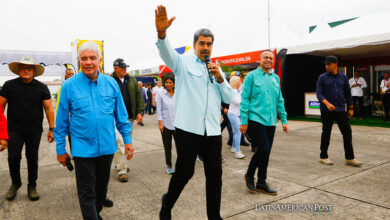The last seven months of the Salvadoran government have been marked by controversial decisions that have affected the popularity of Nayib Bukele in the Central American country.

During this 2021 he has had to face a new reality in his government, which has witnessed for the first time massive protests over some of its most controversial decisions. Photo: TW-nayibbukele
LatinAmerican Post | Yolanda González Madrid
Listen to this article
Leer en español: ¿Por qué ha bajado la popularidad de Nayib Bukele en El Salvador?
Since assuming the presidency of El Salvador in June 2019, Nayib Bukele has enjoyed unrivaled popularity throughout the Americas. However, during this 2021 he has had to face a new reality in his government, which has witnessed for the first time massive protests over some of his most controversial decisions. And it is that although in the streets there have been demonstrations of repudiation, the Salvadoran leader still maintains a good image in the polls. What is the cause of such a phenomenon?
According to a ranking published in October by the Mexican pollster Mitofsky, Bukele remains in the first place of the most popular presidents of America with 71%, although with several points below if we compare it with the 84% of another poll carried out in March of this same year. In principle, this does not seem to be something so serious for the Salvadoran leader, but it could undoubtedly mean the beginning of a downward trend, an almost similar scenario experienced by Bukele's two predecessors in the presidency.
It should be noted that the president has been one of the most popular in the history of the country, generating good comments about his efforts in 8 out of 10 Salvadorans. However, the possible end of the idyll with the people comes just two years after taking office, where the first signs of popular discontent have taken hundreds of streets in El Salvador. The scenarios range from his intention to be reelected even if the Constitution does not approve it, the dismissal of judges, the radical changes in the Constitutional Chamber, to the implementation of bitcoin as a legal currency.
20 Mandatarios de América y el mundo; desde Canadá hasta Argentina y desde Irlanda hasta Australia, aquí #RankingMitofsky @RoyCampos https://t.co/Ob11l1CCJM pic.twitter.com/Fby4kFEzZJ
— CONSULTA MITOFSKY (@Mitofsky_group) March 22, 2021
Bukele and his wrong decisions
During the month of September, more precisely on the 15th, the most massive demonstration in the Bukele era was seen, with the only detail that the thousands of people who were present did not show their support for the president. What should be a march to celebrate El Salvador's 200 years of independence, ended up showing a reality that sought to impose itself on both the president's speeches and decisions. "No to the dictatorship" or "we are fed up with corruption" were some of the slogans and banners that featured in the protest.
The street and social networks turned against the Salvadoran president for the first time after several months of controversial reforms that have led him to decline in popularity. In fact, the United States pointed out that Bukele was following in the same footsteps as Hugo Chávez, albeit in a more accelerated manner, since his intention to promote a constitutional reform that would allow his re-election was an attack on the country's democracy, according to several protesters.
You may also be interested: Daniel Ortega Has Become Increasingly Similar To Maduro
But what has actually been the last straw is the bitcoin issue. The fear of people losing their savings or their pensions because they will be paid in that currency was reason enough to destroy a bitcoin ATM during the demonstrations. Likewise, it has not yet been clear what are the real profits of the public money that the State invested in the cryptocurrency, nor is it known how part of the 200 million dollars of the budget has been invested in the Chivo Wallet computer application to put into circulation the bitcoin.
What to expect in the future?
So far, Bukele's reduction in popularity does not seem to be enough reason to be alarmed, although it has resulted in the official state propaganda apparatus working with greater intensity than before. In a matter of weeks, the president has been seen announcing the construction of a veterinary hospital and some 20 schools with the proceeds of bitcoin, in addition to reopening a road project in the capital and the repair of the main water purification plant of Greater San Savior.
The end of 2021 and all of 2022 will be a difficult road to travel for the Salvadoran president. Among the challenges to be faced is the tension that it maintains with the United States due to the publication of the Engel List, which contains the names of several officials linked to his government who are pointed out for corruption; Likewise, it will be essential to carry out the negotiations with the International Monetary Fund, also clarifying how the funds received by the IMF were used during the pandemic; while the approval of the Foreign Agents Law would be a hard blow for those who intend to make politics against them with foreign donations.
In short, Bukele faces a present that he had never lived before and that is beginning to be decisive for the future of his mandate. The decisions you make from now on must be conscientious, coherent, and aligned with the clamor of your people, the same one that has given you the popularity you currently enjoy.
.@nayibbukele ocupa el primer puesto en #RankingMitofsky Mandatarios de América aprobado por 71%, le siguen Luis Abinader (67%) y empatados en el tercer puesto con 64%, @lopezobrador_ y Guillermo Lasso https://t.co/iKj3Ev1IY5 @RoyCampos pic.twitter.com/imbAH4z4ZZ
— CONSULTA MITOFSKY (@Mitofsky_group) November 3, 2021




